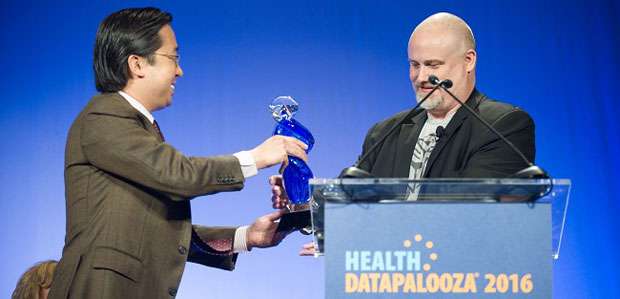About our project
Note: while the original goal was 20K, we consider this project a success and can deliver for less considering the other great stuff that happened during this campaign. More on that later. Thank you for your support.
What new insights can we learn by analyzing how doctors prescribe? We know that prescribing habits vary wildly, and in most cases we do not know why. What happens when we combine prescribing patterns with information about how doctors work together?
Like other ambitious goals set by the DocGraph Community and The DocGraph Journal, we are releasing a massive new data set of prescribing pattern data to help the community of journalists, data scientists, academic researchers, population health analysts, and policy makers better understand the use of medicine and health outcomes. In this case, we will endeavor to merge this prescribing pattern data into the healthcare graph we released last time (November, 2012), and crowdfund the effort to make improvements to the way we model this prescribing data. Every improvement and additional data set that we add to the DocGraph project results in new community contributions and insights.
How it Works
The core idea behind the DocGraph project is pretty simple:
Open Data about the healthcare system can change healthcare by changing the power balances to favor patients.
It has to be the right data.
Open Data sets will be used to provide rich, relevant, and timely information dissemination services, such as websites and applications, across the healthcare ecosystem.
a minor rant about the term “Open Data”
Many “Open Data” projects are neither. It is ironic that they use the term because they are not open, and what they release is so abstracted or aggregated that it probably does not deserve the moniker “data”. Our goal at the DocGraph project is to release relevant and granular data, under well-known open source licenses.
Building on Success
The original DocGraph data set showed how doctors collaborate together. This data was used as the core of our crowdfunding effort and saw the creation of numerous analyses performed in the public (see Ryan Wealth) and by care provider networks aiming to improve the efficiency of their local health system (see HCPIPA). The DocGraph project used that data as the crowdfunding reward for supporting our data journalism efforts. This year we are releasing a new data set about the way doctors prescribe.
Last year, we promised that we would acquire and integrate healthcare data from multiple sources, and that the resulting data would be released open source. We kept that promise and our backers have already received massive amounts of state-level credentialing data with more on the way.
Little did we know that 2013 would be the year of open doctor data sets. The respected news organization Propublica contributed tremendous effort in acquiring a new data set that is just as important as our original healthcare teaming data set. They released a tool, based on the prescription data set called their “Prescriber Checkup”.
We replicated the Propublica prescribing pattern FOIA request, and used this data to create an integrated data set on prescribing patterns, a data set that is immediately compatible with our original DocGraph project. Now, for many doctors in the United States, the resulting data set shows which doctors they prefer to work with and which medications they prefer to use.
We know that working with HHS to get a complex FOIA requested is a tremendous amount of work, and as a result, we are donating ⅓ of all the “data sales” from this crowdfunding back to Propublica. This includes the data sales for the merged data sets, where you can buy both data sets together. In order to support other data journalists upon whose current and future work we rely, we are also going to be making donations from this crowdfund to the Association of Healthcare Journalists (AHCJ) and public.resource.org.
Driving Forward the Open Data Dream
We are continuing our effort to build the best Open Source map of the healthcare system anywhere. The Propublica prescribing pattern data is extremely complex, and the data we are releasing today represents the data with only basic improvements (the ability to link with our original data set using NPIs). We will need to invest in new database architectures in order to fully develop this data set into a ready-to-use technical resource.
What you get for Supporting our Mission
If you choose to participate in this crowdfunding as a “data sponsor”, you will get the raw prescribing data right away. We are partnering with Neo4j and MariaDB in order to provide you with high quality databases that are capable of supporting very complex graph queries.
In fact, our central goal with this new funding is to develop as a single new Neo4j-based merger of the teaming data in the previous data release with the physician prescribing pattern data in the current release.
We have lots of data sets that we can offer as part of the benefits of helping us to sponsor this work. As with all of our crowdfunding efforts, participating in our Medstartr is always the most inexpensive way to get access to our data, since many of these data sets are offered at substantial discounts from our retail prices. We also have incredibly cool t-shirts, and prints from renowned patient activist Regina Holliday.
You Rock!
Whether you are supporting us to get access to this new data set, or you are just supporting our model of opening up radical new data sets, we thank you for your support!!
- Have a question? If the info above does not help, you can ask the project creator directly.
Rewards
For $10 or more
2 Supporter(s)
Helping out / Open Data Supporter: Get listed on our supporter page, and get to feel like an awesome human being when falling asleep tonight!
For $20 or more
0 Supporter(s)
Thank you tweet: @DocGraph will tweet a thank you for your contribution, including a @mention of the twitter account of your choice!!
For $60 or more
0 Supporter(s)
Everyone Loves a T-Shirt: This is a great way to support our project! If you like, you can choose to contribute $10 extra at any funding level above $60 and we will also send you a t-shirt!
For $100 or more
3 Supporter(s)
DocGraph RX OSE database: With this you get one year of access (and three years of discounts) to the Open Source Eventually version of the DocGraph RX database (normally $200). This version asks that any application or analysis your derive from this database be contributed back to the community (with attribution) under the license of your choice.
For $250 or more
9 Supporter(s)
DocGraph RX Bundle database: With this you get one year of access (and three years of discounts) to the Open Source Eventually version of the DocGraph RX database (normally $200), along with the OSE version of the original DocGraph teaming data, and the state-level data.
For $500 or more
0 Supporter(s) Limited (20 left of 20 )
Regina Holiday DocGraph Print: If you love rare stuff, have a little cash, and don’t have very much time, then you can get a rare, limited-run print from celebrated patient artist Regina Holliday
For $1000 or more
4 Supporter(s)
DocGraph RX Proprietary Friendly Database: With this you get one year of access (and three years of discounts) to the Proprietary friendly version of the DocGraph RX database (normally $2000).
For $1000 or more
0 Supporter(s) Limited (20 left of 20 )
Individual Sponsorship: Link to your website on the sponsor page, 2 invitations to the data set launch events, dinner with Fred Trotter and the DocGraph team!! You are responsible for your own travel expenses.
For $2500 or more
0 Supporter(s)
DocGraph RX + DocGraph original dual database: With this you get one year of access (and three years of discounts) to the Open Source Eventually version of the DocGraph RX database (normally $5000). This includes the original teaming database, access to the ongoing state credentialing data, and of course, DocGraph RX.
For $5000 or more
0 Supporter(s) Limited (20 left of 20 )
Corporate Sponsorship: Add your corporate logo and link to the DocGraph sponsor page! Also included are 2 invitations to the data set launch events, dinner with Fred Trotter and the DocGraph team!! You are responsible for your own travel expenses.
For $5000 or more
1 Supporter(s)
Database Engine Sponsorship: We will deliver the DocGraph data set to you in the database format of your choice (if you need a proprietary database format, you will need to buy us a license).
No updates found .
No comments found .
Login to post your comment! Click here to Login
backed on 10/29/2013
backed on 10/29/2013
backed on 10/28/2013
backed on 10/28/2013
backed on 10/27/2013
backed on 10/27/2013

backed on 10/27/2013
backed on 10/27/2013
backed on 10/26/2013
backed on 10/26/2013
backed on 10/25/2013
backed on 10/25/2013
backed on 10/25/2013
backed on 10/24/2013
backed on 10/24/2013
backed on 10/24/2013
backed on 10/22/2013
backed on 10/18/2013
backed on 10/13/2013
backed on 10/13/2013
backed on 10/13/2013
backed on 10/11/2013
backed on 10/10/2013
backed on 10/07/2013
backed on 10/01/2013
backed on 09/27/2013
backed on 09/26/2013
backed on 09/26/2013
backed on 09/26/2013
backed on 09/25/2013









